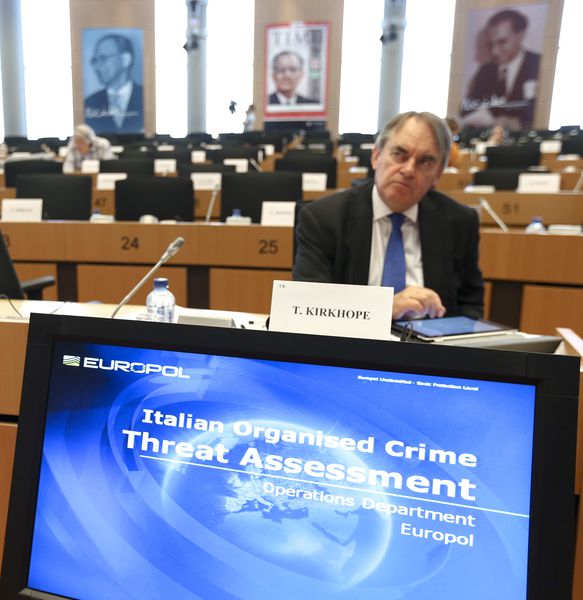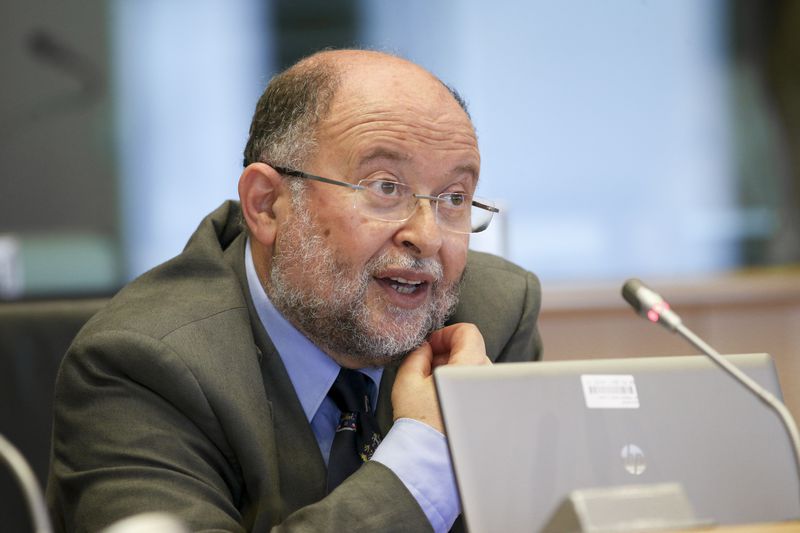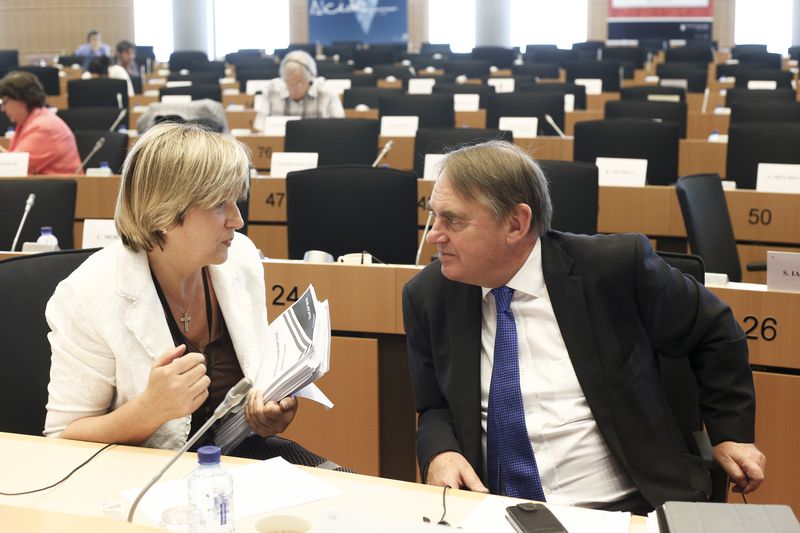Mafia - a Substitute State
Zhaneta Kuyumdzhieva, Adelina Marini, July 25, 2013
 When recently I came across the words of Sicily mafia boss Giuseppe Abate, whose vision about politics is based on the simple thesis that "when you have hot sun, poverty and ignorance, politics is self-made", I told myself: "well, that's why in spite of our moderate climate, in our field the genius of self-making politics grows so well". However, with some, maybe non-essential for the outcome, differences but, instead, important to describe the current image and dynamics of the mafia. While in Bulgaria for almost two months tens of thousands of Bulgarian citizens have been protesting against the overtaking of the state by the mafia, in the European Parliament the temporary committee on organised crime, corruption and money laundering reviewed the detailed report by Europol evaluating the Italian organised crime.
When recently I came across the words of Sicily mafia boss Giuseppe Abate, whose vision about politics is based on the simple thesis that "when you have hot sun, poverty and ignorance, politics is self-made", I told myself: "well, that's why in spite of our moderate climate, in our field the genius of self-making politics grows so well". However, with some, maybe non-essential for the outcome, differences but, instead, important to describe the current image and dynamics of the mafia. While in Bulgaria for almost two months tens of thousands of Bulgarian citizens have been protesting against the overtaking of the state by the mafia, in the European Parliament the temporary committee on organised crime, corruption and money laundering reviewed the detailed report by Europol evaluating the Italian organised crime.
And as in Bulgaria rulers and ordinary citizens often excuse their inaction to handle this curse on the prosperity and normal existence of states and societies, saying that neither corruption nor mafia are a Bulgarian invention, it would really matter a lot if Europol prepared a similar report on the Bulgarian oligarchy and the interconnectedness between the organised crime and the state, although the conclusions about the Italian organised crime sound too familiar.
If in Bulgaria the romantic and to some extent moral element in the behaviour of the crime groups is absent, there, of course, where money matters too, three are the factors that are in the foundation of the Italian organised crime - family, power and territory. Although it views them as separate subtopics in its analysis from June 2013, Europol is not interested in them separately, but rather in terms of contextual ideas the study of which will outline mafia behaviour and the threat they pose to the European community.
The family - the sentiment which the mafia builds its power upon
Probably because of the long years of "presence" of foreign forces in southern Italy, among the communities there does not exist an established social economic and industrial structure. The state is often perceived as greedy, hostile instance which imposes fees without providing services, thus creating an opportunity for the families to present themselves as the most reliable and secure environment. The excessively well developed sense of belonging to the family turns, however, into a hamper for the normal development of the community.
This feeling helps mafias build their power and strength - a complete dedication to the group, strong emotionality, helped by centuries-old local traditions, building of an image of sacrifice which justifies the aggressive behaviour (everyone are against us, but we will defeat them), maintaining mistrust to the state and its laws, strict rules for reward or punishment, strong underlining of the concept of honour and relentless attitude toward those who are tagged as traitors. Here, may be as parallel, it is worth recalling the interview a few years ago a leading figure of the Bulgarian organised crime - Zlatomir Ivanov the Barret - gave. For the bTV he said that crime exists under its own rules which are very strict and clear and everyone adheres to them. "There, everyone sticks to their word and when break their word, they get what they deserve".
A substitute of the state or a state within the state?
If the state is characterised by exercising sovereignty over a certain territory and communities who live on it, in the behaviour of mafia cannot be found a direct antipode of the supreme authority, but rather a substitution. This claim is defended with the following arguments:
- The mafia exists in parallel to the state authority, although often it penetrates its structures with the aim to weaken it and to take advantage of public goods;
- Organised crime groups use force to achieve their goals and that is a prerogative of the state;
- On their territories of influence, the crime groups, though informally, administer justice, impose fees, provide services and social security, reward and punish, exercise control over the labour market, trade.
Unlike the sovereign state, however, the mafia does not plan, does not finance the construction of infrastructure, although groups often penetrate this area through corruption and in this way they manage such activities. Something that is painfully familiar to us in Bulgaria. If the state can do much better without the mafia, the latter cannot survive without the state. "The Mafias are parasitic in nature, hosted and nourished by the healthy parts of the community. In the areas under their control they carefully regulate the impact of their criminality on productive activities, perfectly aware that an excessive strain on them could eventually stifle the production, leading to the death of the healthy socio-economic organism and, with it, its parasite. A parasite killing the organism that nourishes it would be foolish, and Mafias are far from being foolish", is the Europol's analysis.
Mafia men as men of honour and their control over the territory
As far as mafia is concerned, respect comes as an evaluation, an acknowledgement of power and influence. Often, the connectedness with such a group is enough to create a feeling of respect. This stereotype is established and strongly accepted, in spite of the obvious incapability to respect blackmailing, violence over innocent people, etc. Probably, in order to maintain such an image, the Sicily group Cosa Nostra calls its members "men of honour" and another crime group - Ndrangheta from Calabria - owes its name to the Greek word ἀνδραγαθία which means heroism, virtue.
Force, for its part, is linked to territory and its "taking". The goals of organised crime in Italy, however, are far from only controlling a territory. The mafia penetrates all areas of public life, turning them into a "substitute" of the state. By "installing" members of clans or families at key positions in politics and businesses a vicious circle is created of threats, corruption, services and hence of control - both over public finances and the electorate. Additionally to the evident taking of advantage of public money, through their natural or intentional incompetence they create a non-functioning, distanced from citizens and inefficient administration.
Beyond their place of origin and established influence, the mafia groups rarely attempt to take control over the host territory with the means they traditionally use. They rarely rely on the advantage the  stereotype of respect gives such clans as in southern Italy, and instead they try to achieve their illegal goals mainly by penetrating economic sectors through corruption.
stereotype of respect gives such clans as in southern Italy, and instead they try to achieve their illegal goals mainly by penetrating economic sectors through corruption.
In its study from June 2013, Europol makes an attempt to describe the psychology, behaviour, zones of influence and interests of the strongest Italian groups - the Sicily-based Cosa Nostra, the Calabrian Ndrangheta, Neapolitan Camorra and the Apulian organised crime which often is recognised in the group Sacra Corona Unita, but also in Societa Foggiana, Gergano's Mafia, Camorra Barese.
The oldest and traditionally widest spread manifestation of the mafia is Cosa Nostra which operates mainly in North America. Outside Italy, it is predominantly associated with money laundering which it successfully legitimises as a legal business. In this way, the group has penetrated the economies of a number of countries like South Africa, Canada, USA and Spain. Its subdivisions Cursoti and Laudani represent a significant threat at European level because they are involved in violent crime activities like armed robberies.
Among the richest and most influential groups is Ndrangheta which dominates the European market of cocaine and has excellent connections with producers of narcotic substances. The mafia from Calabria has a hierarchic structure and has proved in time its "skills" to infiltrate in the political and economic life, as well as its remarkable potential to use and impose corruption mechanisms. Through legitimate businesses, the group has managed to establish quasi-monopoly in many sectors like construction, real estate and transport. Its influence is strongest in Spain, France, Belgium, The Netherlands, Germany, Switzerland, Canada, USA, Columbia and Australia.
Camorra represents a horizontal structure of clans and families. Unlike the Sicilian and Calabrian mafias which maintain low profile, here the leading members maintain visibly high standard of living and afford themselves extravagant whims. Outside its territories of influence, the group is "specialised" mainly in drug trafficking, cigarettes smuggling, illegal waste management or trade of counterfeit goods. Camorra is one of the main producers of counterfeit euro banknotes sold on the market by other crime groups. The presence of these clans and families of the Italian mafia is mainly in Spain, France, The Netherlands, Germany, Switzerland, Eastern Europe, USA and Latin America.
The traffic of drugs, people, arms, the illegal waste management and smuggling of tobacco are the main activities of the Apulian mafia as well, which is represented by several smaller groups. All of them operate mainly in The Netherlands, Germany, Switzerland and Albania.
How can the EU counteract the mafia?
Precisely because of the broad spectrum of "interests' of the mafia, Europol provided the lawmakers of community policies with several tasks:
1. To establish a more coordinated policy, anti-mafia legislation harmonised at EU level that should identify crime groups and prioritise their dismantling;
2. Such a legislation should accept that being a member of a mafia group is a crime;
3. A special funding mechanism should be established to support international law enforcement bodies in their investigations, especially in today's times of strong difficulties in securing the work of relevant officers and their access to money for technical and communication devices, ensuring them with transport expenses, etc.
4. All investigations of clans and families should be accompanied by parallel financial investigations in the very early stages;
 5. Undertake stricter measures to confiscate property that, according to initial studies, exceeds the needed resources to fund the relevant bodies.
5. Undertake stricter measures to confiscate property that, according to initial studies, exceeds the needed resources to fund the relevant bodies.
6. The trans-border character of activities of mafia organisations and the globalisation of financial markets create pre-conditions for money-laundering to thrive. Although even now there is essential harmonisation of the EU legislation in this direction, a more general approach is needed to read correctly the financial information law enforcement bodies gather.
7. Strengthening the work of local authorities, especially in enabling them to correctly assess the threat mafia organisations pose to the EU member states, even if in the country itself the activities of such groups are not that strong.
What makes strong impression in the report is the authors' hestitation in their assessment whether the incompetence of mafia on the political stage is unintentional or intentional. Either way, it is clear that the fight with mafia should be completely intentional and deliberate. Otherwise, given that the crisis in Europe is turning into a more continuous process of restructuring and adaptation to the new economic realities, the mafia parasitising could further deteriorate the already declining standard of living in the developed and prosperous countries, while the poor, such as Bulgaria, to be deprived of a chance to reach at least the average level of prosperity in the EU some time in the future.
 Federica Mogherini | © Council of the EU
Federica Mogherini | © Council of the EU | © Council of the EU
| © Council of the EU Luis De Guindos | © Council of the EU
Luis De Guindos | © Council of the EU